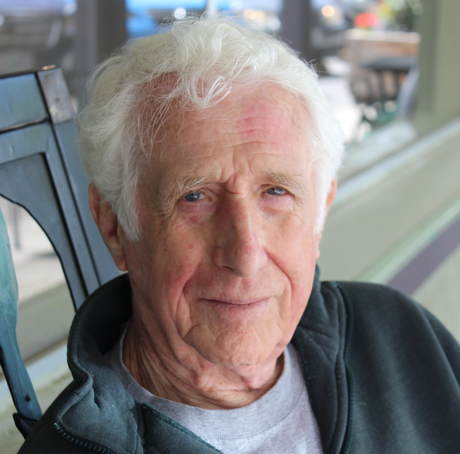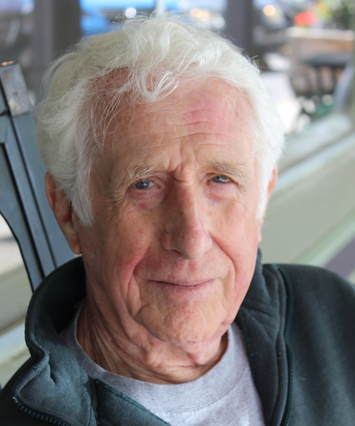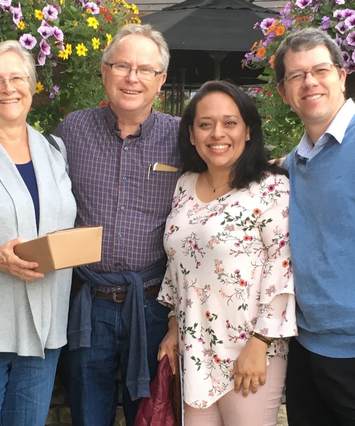In June 2018, Rob and Susan Corcoran spent several days in Seattle, Washington, meeting friends from the MRA/IofC network. This is a part transcript of their interview with Paul Colwell.
A singer-songwriter who, along with his two brothers, formed the Colwell brothers. As rising teenage stars in the early 1950s, they encountered MRA and devoted their talents to bringing change to the world through music. They were the impetus behind Up With People which has engaged thousands of young people. Paul is a high school paraprofessional at Vashon High School and still plays in several bands.
What was it about MRA that grabbed your attention or intrigued you?
It was 1951 and we saw a play in Los Angeles called Jotham Valley with our parents. In the play, the brothers were feuding, and of course we three brothers were playing music together, so that story appealed to us. And then the people we met – there was a quality there that pulled us in, they were outgoing, they were friendly, upbeat. It definitely grabbed our youthful idealism. In the 50s there was very little going on that was related to doing something to making a difference in the world, so it was the scope – that was the other thing – right away we heard about what MRA was doing around the world and the leaders who were involved, people of significance.
The global vison?
Yes, it was not a just some small movement; it was something pretty big and important. And then as brothers it touched us personally in terms of our own lives. The logic of changing the world was something we really hadn’t thought about; the idea that if you want to change the world then you’d better make some changes in your own life. And we all kind of went through that, it was very enlightening to us.
So, you have been at this for more than 70 years…
I was 16 when I first saw Jotham Valley.
Life has its ups and downs and takes different turns. Are there things in particular that you feel you have carried with you, that have remained constant?
Certainly, our world view, our experiences as we traveled, our appreciation of other cultures, and the realization that we are all in the world together and that we have to work things out together. The idea that everybody is important: “Up With People.” It’s recognizing our common humanity. The other thing we learned a lot about was caring for people, caring for everybody, noticing the person who is being left out, and paying attention, really paying attention to people. In my work in the school now I try to get to know everybody’s name. You’ve got to notice kids, you know, they want to be noticed, they want to be recognized. People are more important than things – that is something we often talked about. Then integrity. That’s a term that covers a lot of territory. We’ve had our ups and downs, but I think that we have hopefully carried it though our lives.
What has been the biggest challenge you have confronted?
Marriage! I grew up with brothers, I had no idea, I knew nothing about girls. We needed a sister, but we didn’t get one. To stay in a marriage and a relationship, that’s as big a challenge as any. The other has been the challenge of writing. I am rather a perfectionist, so I approach writing songs with great trepidation, and having to produce a show every two years – we were on a two-year cycle because of our marketing so you had to create a whole new show. The research part of it was interesting, because you got to see where the world is and what you want to say. But the other thing is you had to come up with new ways of saying the same thing over and over again.
Someone asked me once, “What inspired you to write a song?” and I said “Fear.” The constant pressure, the stress of having to write. As a result, I have never written a song I didn’t have to write. I don’t just sit down and say I think I’ll write a song. I did do that once or twice back when we were kids, when we were recording for Colombia records.
I don’t think people realize that aspect of writing or any kind of creativity.
Particularly if it is an assignment. You’ve done some of that yourself.
Someone was reading my book and she asked “What is your writing practice? “and I said basically I sit down and work at it until something comes out the other end. Inspiration doesn’t always pop out like that.
Yes, a lot of perspiration!
Is there anything that you would do differently if you had another run at it?
No, I think I have kind of come to terms with who I am. I have traveled a certain road and it’s been a journey of growth and learning and ups and downs. There are a lot of things in the way I do things that I would change. I am not well organized, I don’t have great discipline, I procrastinate. I wish I had wasted less time, but sometimes in the creative field that is not wasted time.
Perhaps also the way we hooked up with our mates. I would have taken more time to get to know my wife and let her get to know me, but we were always on the run, we did it in the fly.
Still it turned out pretty well!
Yes, it did! But I would have done more of a normal courtship. But it wasn’t to be, and we’ve hung in there.
What keeps you strong, what bolsters your spirit, gives you hope?
Young people. Those of us who have experienced the great expanse of history and seen all the changes and see what is wrong with the world, we see the world very differently from the kids I deal with at high school. They’ve got great enthusiasm, great passion for music, wanting to make a difference. I was working on the scholarship committee reading their essays. They were all about wanting to help their fellow human beings. That gives me hope. You’ve got a generation with probably more stacked against them than we’ve ever had, because back in my childhood it was the threat of atomic annihilation, but now you have the possibility of an environmental end of things. It’s interesting – the world comes together and then falls apart – that may be a cycle as well, and the fact that this whole trend of nationalism is a reaction to some of the things that are wrong about globalization. These things have to be adjusted. But young people are in the world that that they’re in; they just take it for what it is and move on from there. I think there is a lot of commitment in young people to do something for the environment, for helping people who are struggling. This has been my experience.
What advice would you give to the next generation who are starting out on this journey of world changing, life changing? What thoughts would you want to pass on to them?
First of all, you want to encourage them in the good things they want to pursue. My advice would be to do something that will make a difference but don’t feel as if you have to do everything; and to treat people well, treat people with kindness, even people you don’t agree with. Try to listen to those who don’t agree with you and try to understand where they are coming from because we are in a very polarized state of the world now. Be open, have an open mind, don’t latch on to one opinion and then say that anyone who doesn’t agree with you is your enemy. Realize that they are human beings and that there is a reason for them believing what they believe. Never give advice. Wait a second, I just did!
Having been part of and experienced the evolution of MRA/IofC over many decades, some of which may have been better than others, where do think its best contribution can made in the word? l was interested in your advice to young people to get involved but don’t try to do everything. My impression is that in earlier years one of the mistakes MRA made have made was to think that we could do everything, that we were the only ones.
Yes, it's just like you said. We wrote a song once, "This is it, no sense in looking anymore.” Of course, what we were doing was just a part of the big picture. Years later we wrote another song called "Where the Roads Come Together" that had the line "There are many roads to go…” I think we've all evolved and expanded. You asked what I thought might be IofC's best contribution at this point. I'm in no position to give advice on that but would just say keep doing the important work you're doing in the world, like all the impressive things you've done in Richmond. And I'll keep trying to do my part.



